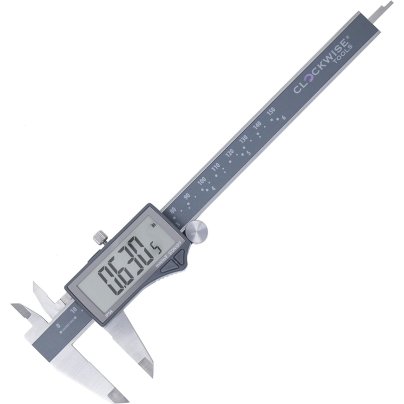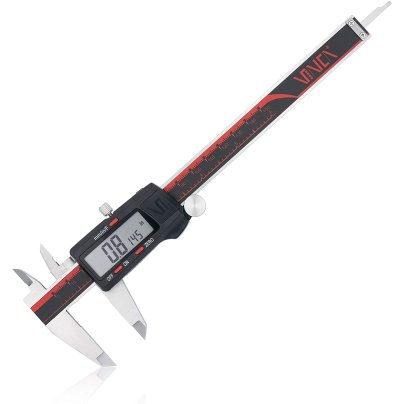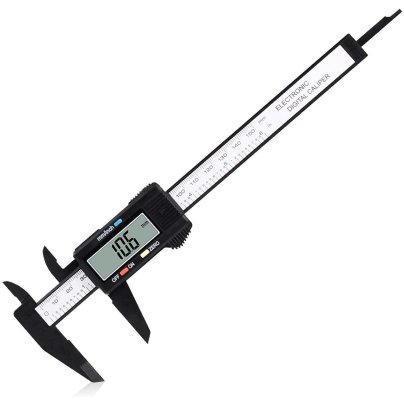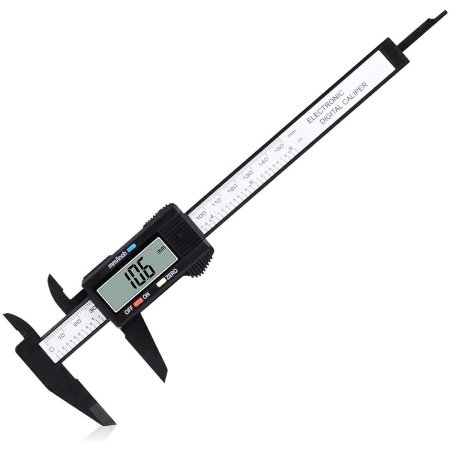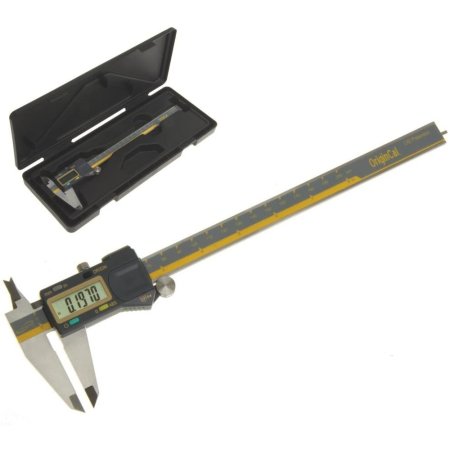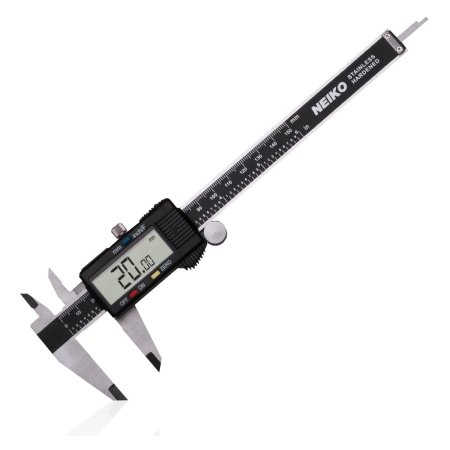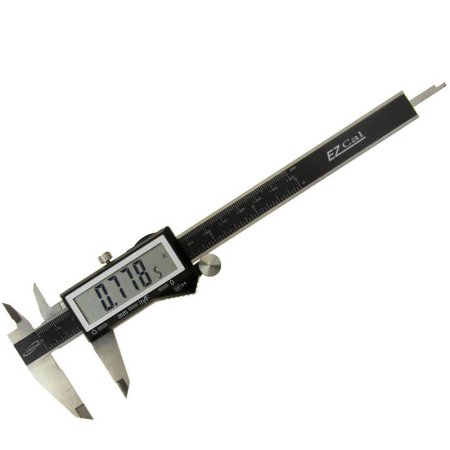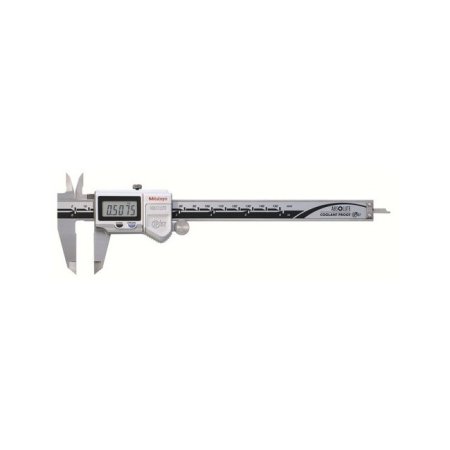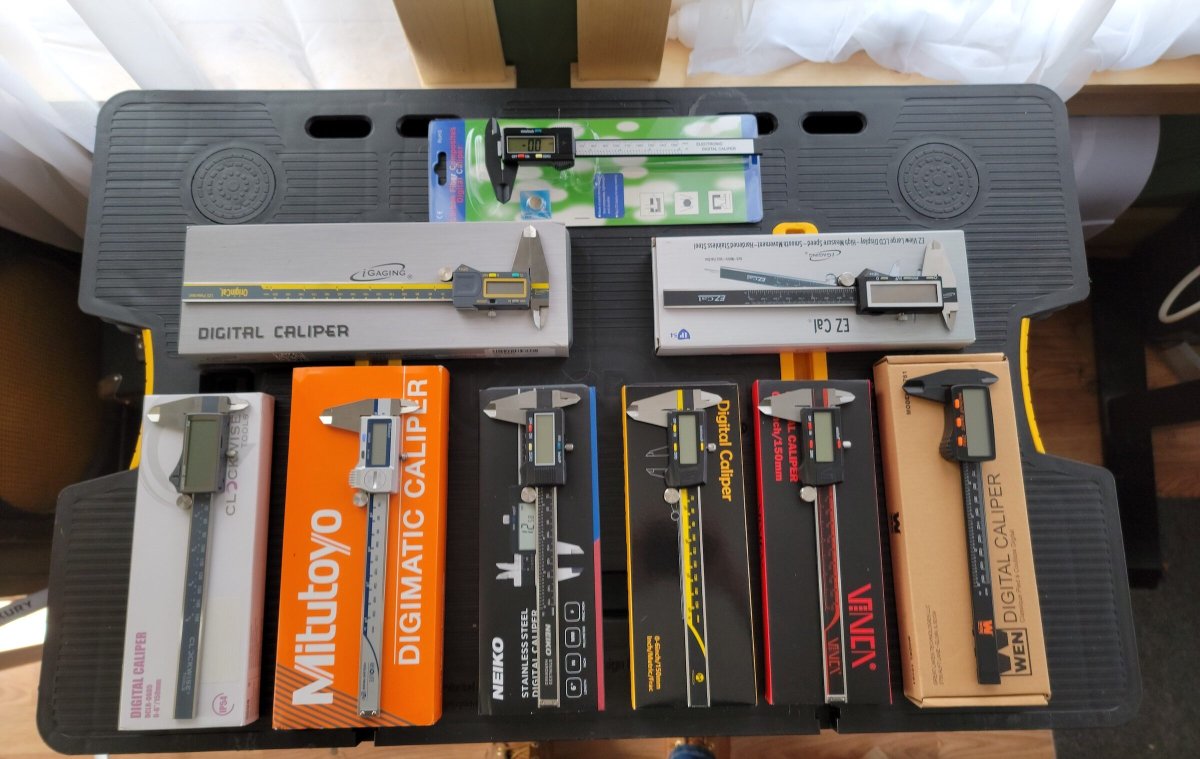
We may earn revenue from the products available on this page and participate in affiliate programs. Learn More ›
Calipers have been around for centuries, standing the test of time as one of the most effective and accurate measuring tools. Even though several types of calipers are available to serve different functions, vernier calipers have proven to be the best general-purpose option for measuring the outside diameter, inside diameter, and depth of various objects.
Older dial and venier calipers, though effective for a time, are now being replaced by the new advancements that digital calipers are capable of. As Jonathan Warshaw, a woodworker with over 15 years of experience and owner of SimpleWoodworker, states, “digital calipers boast versatility in measuring a wide range of materials and dimensions, and they overcome the parallax error often encountered with dial and venier calipers.”
Digital calipers make extremely precise measurements for woodworkers, construction workers, and even mechanics. Our favorite digital caliper is the Clockwise Tools Digital Caliper because of its IP54 weather-resistant material; large, easy-to-read display; automatic shut-off feature; and data transfer port.
To take advantage of everything digital calipers offer, learn more about choosing the best digital calipers and check out what we found in our hands-on testing of the following models.
- BEST OVERALL: Clockwise Tools Digital Caliper
- RUNNER-UP: Vinca Electronic Digital Micrometer Caliper
- BEST BANG FOR THE BUCK: Adoric Digital Caliper Measuring Tool
- UPGRADE PICK: iGaging 8” Absolute Origin Digital Caliper
- BEST EASY OPERATION: Neiko Electronic Digital Caliper
- BEST WATER-RESISTANT: iGaging EZ-Cal Digital Caliper
- BEST FOR HARSH CONDITIONS: Mitutoyo Digimatic Caliper
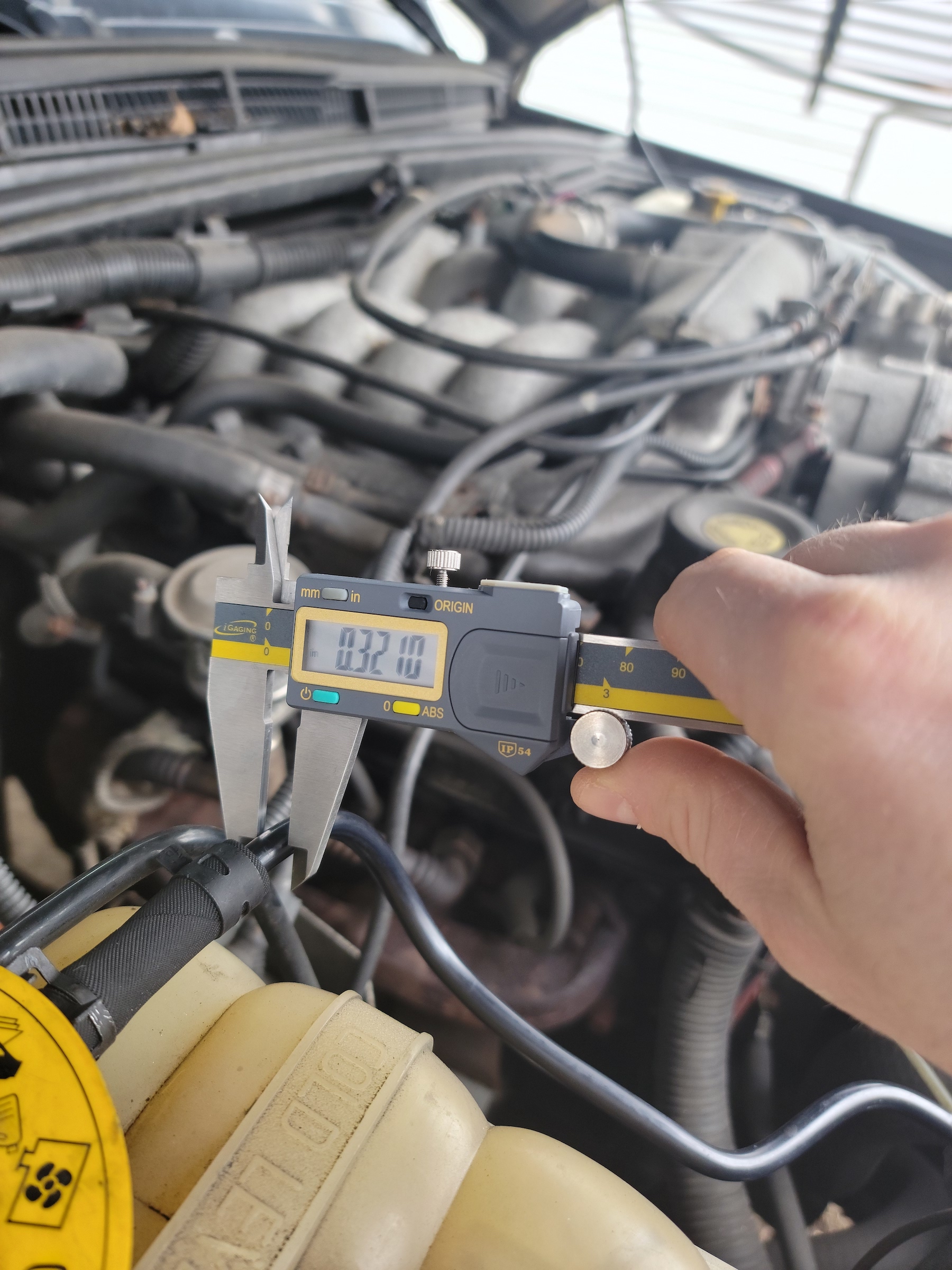
How We Tested the Best Digital Calipers
When we assembled a list of hand tools, we wanted to ensure we recommended only the best digital calipers. To ensure that was the case, we performed hands-on testing with all these modelsand consulted experts on their opinions.
Warshaw attests, “When on the hunt for a digital caliper, it’s pivotal to consider factors such as accuracy, ease of use, durability, and the range of measurements it can handle. Additionally, the digital readout clarity, battery life, and the material of construction are crucial.”
The first test involved the setup to ensure that all of these models were easy to assemble, activate, calibrate, and use. Next, we set out to test their accuracy, checking the thickness of some leather, angle iron, and wood.
In the next test, we checked the depth of several finely machined photography tube extensions we had on hand. Last, we checked the inner dimensions of the same extensions. For tools that could handle the elements, we checked the accuracy of some greasy, dirty fittings under the hood of an old project car.
Last, we compared all of the features each model had to offer to ensure they were worth the investment. With these tests performed, we could assemble a list of accurate, easy-to-use digital calipers that will deliver.
Our Top Picks
We performed hands-on testing with the following models to help shoppers decide which digital caliper is right. Consider the top picks listed in several categories for the best set of digital calipers.
Best Overall
Clockwise Tools Digital Caliper
Pros
- Large display is very easy to read; suitable for newcomers as well as pros
- IP54 weather resistance makes it suitable for rough or wet weather
- Automatic shutoff activates after 5 to 7 minutes to preserve battery life
- Data transfer port uploads measurements to a computer for added convenience
Cons
- Analog markings on the rule may be a little confusing for some users
Product Specs
- Range: 0 to 6 inches/150mm
- Measurement styles: Imperial, metric, and fractions
- Additional features: Data port
With polished stainless steel and a large digital display, the Electronic Digital Caliper from Clockwise Tools takes measurements down to 0.0001 inches. It has large push buttons on the digital display that allow the user to toggle between metric, standard, and fraction measurements.
The Clockwise Tools caliper features stainless steel construction and offers IP54 protection certification to ensure the tool can withstand moisture and dirt. A data transfer port uploads measurements to a computer. An automatic shutoff kicks in after 5 to 7 minutes of dormancy to preserve battery life. While these calipers don’t have a calibration certificate, they are precalibrated before shipment.
During testing, the large display was the star of the show since it’s very easy to read. Also, sliding the jaws open and grabbing a quick, accurate measurement was simple (thanks in part to that big display). The one thing we didn’t like was the analog rule, as the markings are anything but traditional.
Get the Clockwise Tools digital caliper on Amazon or Walmart.
Runner-Up
Vinca Electronic Digital Micrometer Caliper
Pros
- Analog rule is very easy to read and adjust with the 3 built-in measuring modes
- ⅕-inch LCD display shows measurements clearly and accurately
- Durable stainless steel construction held up well while testing
Cons
- Battery cover popped off occasionally while in use
Product Specs
- Range: 0 to 6 inches/150mm
- Measurement styles: Imperial, metric, and fractions
- Additional features: Data port
Anyone hunting for a quality set of calipers might consider the Vinca DCLA-0605 Electronic Digital Micrometer. These 6-inch digital calipers from Vinca are made with polished stainless steel for durability and ease of use. The tool has a 1.5-inch LCD display and can clearly show measurements with an accuracy of up to 0.0001 inches. The user can convert measurements to inches, millimeters, or fractions, and it features a data port for electronic measurement retrieval.
Unfortunately, this pair of calipers doesn’t have a calibration certificate, but every model is factory-calibrated before shipment. They also don’t have IP54 certification, although Vinca offers a one-year warranty and a sturdy storage case for protection.
We found the Vinca very easy to read as a digital caliper and when using its analog rule. The build quality was spot on and gave this caliper a heavy-duty feel. And while the battery cover occasionally popped off, we felt this model was priced well.
Get the Vinca digital caliper on Amazon.
Best Bang For The Buck
Adoric Digial Caliper Measuring Tool
Pros
- Affordable price point compared to similar options on the market
- Large 1.5-inch LCD display is easy to read and has an automatic shutoff for conserving battery life
- Provides measurements down to 0.01 of an inch for accuracy
Cons
- Battery cover pops off from time to time
- Plastic construction (we found no carbon fiber); may not be as durable as some comparable options
Product Specs
- Range: 0 to 6 inches/150mm
- Measurement styles: Imperial and metric
- Additional features: None
For an affordable option that doesn’t skimp on accuracy, Adoric’s 6-inch digital caliper is hard to beat. This model provides measurements down to 0.01 of an inch and has a 1.5-inch-wide display. The construction is all plastic and provides measurements in imperial or metric units.
This caliper’s product description boasts carbon fiber components, but we didn’t find any in the model we tested. However, we did find that the display was very easy to read, and despite being all plastic, the model was easy to use. The battery cover did pop off a few times, but the affordable price point and accuracy make it worth considering as a value-minded pick.
Get the Adoric measuring tool on Amazon.
Upgrade Pick
iGaging 8” Absolute Origin Digital Caliper
Pros
- Larger than traditional digital calipers on the market
- Contrasting marks on the analog ruler are easy to read
- Weather resistance adds quite a bit of value; comes with IP54 protection
Cons
- Small screen is a little difficult to read compared to some other options available
Product Specs
- Range: 0 to 8 inches/200mm
- Measurement styles: Imperial, metric, fractions
- Additional features: Cable port
Any at-home machinist looking to upgrade from their old caliper to a serious tool should check out iGaging Absolute Original 0-8″ Digital Caliper. This model features stainless steel construction, metric and imperial measurements, and measurements down to 0.0001 inch. It also features a data port for electronic data transfer.
This tool features IP54 protection, meaning it’s less likely to take damage from the elements if used outside of a controlled environment. Also, its larger size allows it to grab measurements on larger parts than the standard caliper.
The iGaging Absolute Origin’s larger proportions was the first thing we noticed during testing, as it can grab measurements from larger objects. Also, we liked that the contrasting marks on the analog rule were easy to read, and its weather resistance adds quite a bit of value, especially when taking the type of outdoor measurements the larger jaws allow. The screen is a little small, but the digits fill it completely for semi-easy reading.
Get the iGaging digital electronic caliper on Amazon.
Best Easy Operation
Neiko Electronic Digital Caliper
Pros
- Easy-to-read contrasting analog rule and digital display
- Built-in data port can record measurements on a computer for added convenience
- Slides smoothly with the thumbwheel mechanism for accurate positioning
Cons
- Digit size for decimals shrinks while in use; may not be ideal for some users
Product Specs
- Range: 0 to 6 inches/150mm
- Measurement styles: Imperial, metric, fractions
- Additional features: Data port
When it comes to grabbing measurements quickly and accurately, Neiko’s 01407A Electronic Digital Caliper is worth a look. This factory-calibrated caliper features a knurled set screw and thumbwheel and offers measurements between 0 and 6 inches, or 150mm, in metric, imperial, or fractions. It features a built-in data port for data transfer.
However, it lacks a warranty or IP54 protection certification. Despite these drawbacks, its ease of operation and stout design make it work well for accurate measurements.
We thought the Neiko 01407A Electronic Digital Caliper was especially easy to use during testing. First, we liked that the contrasting rule and digital display were both easy to read (though the digit size for decimals does shrink). Also, the thumbwheel was easy to operate for grabbing quick measurements and swapping between inside jaws, outside jaws, and depth measurements.
Get the Neiko digital caliper on Amazon.
Best Water-Resistant
iGaging EZ-Cal Digital Caliper
Pros
- Extra-large analog rule display provides ample ease of use; suitable for those with poor vision
- Measures accurately at up to 0.0001 inches for reliability
- IP54 weather resistance for rough or wet conditions
Cons
- Just one screw holds the slide in place; may not be as durable as some comparable options
Product Specs
- Range: 0 to 6 inches/150mm
- Measurement styles: Imperial, metric, and fractions
- Additional features: None
Those who regularly work in wet conditions and need a water-resistant digital caliper will appreciate the iGaging IP54 Electronic Digital Caliper. This tool’s IP54 certification ensures it can withstand water and dirt and accurately measure up to 0.0001 inch. It features stainless steel construction and a 2-inch-wide display with large digits for easy reading. It converts measurements between imperial, metric, and fractions as well.
We found the EZ-Cal extremely easy to use during testing, with its extra-large digital display, contrasting analog rule, and easily operated jaws. On top of the weather resistance, this caliper’s large digital display and stainless steel construction feel sturdy and reliable, and we wouldn’t hesitate to use it in wet conditions.
Get the iGaging digital caliper on Amazon.
Best For Harsh Conditions
Mitutoyo Digimatic Caliper
Pros
- Extreme environmental resistance; IP67 certification resists dirt, grime, dust, water, coolant, and antifreeze
- One of the easiest to use and extremely accurate; measures within 0.0005 inches
- Heavy-duty construction; made with durable stainless steel
Cons
- It is expensive compared to some other options on the market
- Small screen compared to other options on the market
Product Specs
- Range: 0 to 6 inches/150mm
- Measurement styles: Imperial and metric
- Additional features: None
Anyone needing to measure an object or component in truly awful conditions should check out Mitutoyo’s 500-722-20 Digimatic Caliper. This model features stainless steel construction and IP67-certified protection to withstand dirt, grime, dust, water, vehicle coolant, and antifreeze.
Mitutoyo’s digital calipers offer some of the highest levels of accuracy on the market: up to 0.0005 inch/0.1 millimeter. Moreover, it comes in a sleek protective case for added protection. It’s expensive, offers decimal readouts only, and lacks a data port for transferring measurements to a computer.
During our test, we immediately felt the difference in build quality and materials that went into this digital caliper compared to the others. It’s a heavy-duty tool, and it weighs 1 pound. We also liked the weather resistance, as we felt totally comfortable measuring hoses on one of our leaky old project cars. Also, it’s hard to argue with the degree of accuracy this model offers.
Get the Mitutoyo digital caliper on Amazon.
Also Tested:
WEN Electronic 6.1-Inch Digital Caliper
We continue to give WEN tools a try since the brand truly does offer some diamonds in the rough, especially at affordable prices. We wanted to try the 10761 Electronic 6.1-inch digital caliper for its extra-large display and agreeable price, hoping this would be one of those diamonds.
However, it just turned out rough. First, understand that the display is outstanding. It really is one of the better displays in the test. However, this model would not hold an accurate calibration. Each time we zeroed this model out at its closed position, it would give us another reading, sometimes as much as five-hundredths of an inch. That’s reason enough for us to give this WEN the heave-ho from our list.
Jump to Our Top Picks
What to Consider When Choosing Digital Calipers
Digital calipers have several components that go into their overall function and design. They contain inside/outside jaws to measure inside and outside diameters, a depth gauge, an LCD display that shows the measurements on a digital screen, a main scale, and a thumbwheel that moves the jaws up and down the scale.
Each of these components has characteristics that affect its function, so when looking for the best digital calipers for a specific set of needs, understanding these elements and how they work can help shoppers make the best choice.
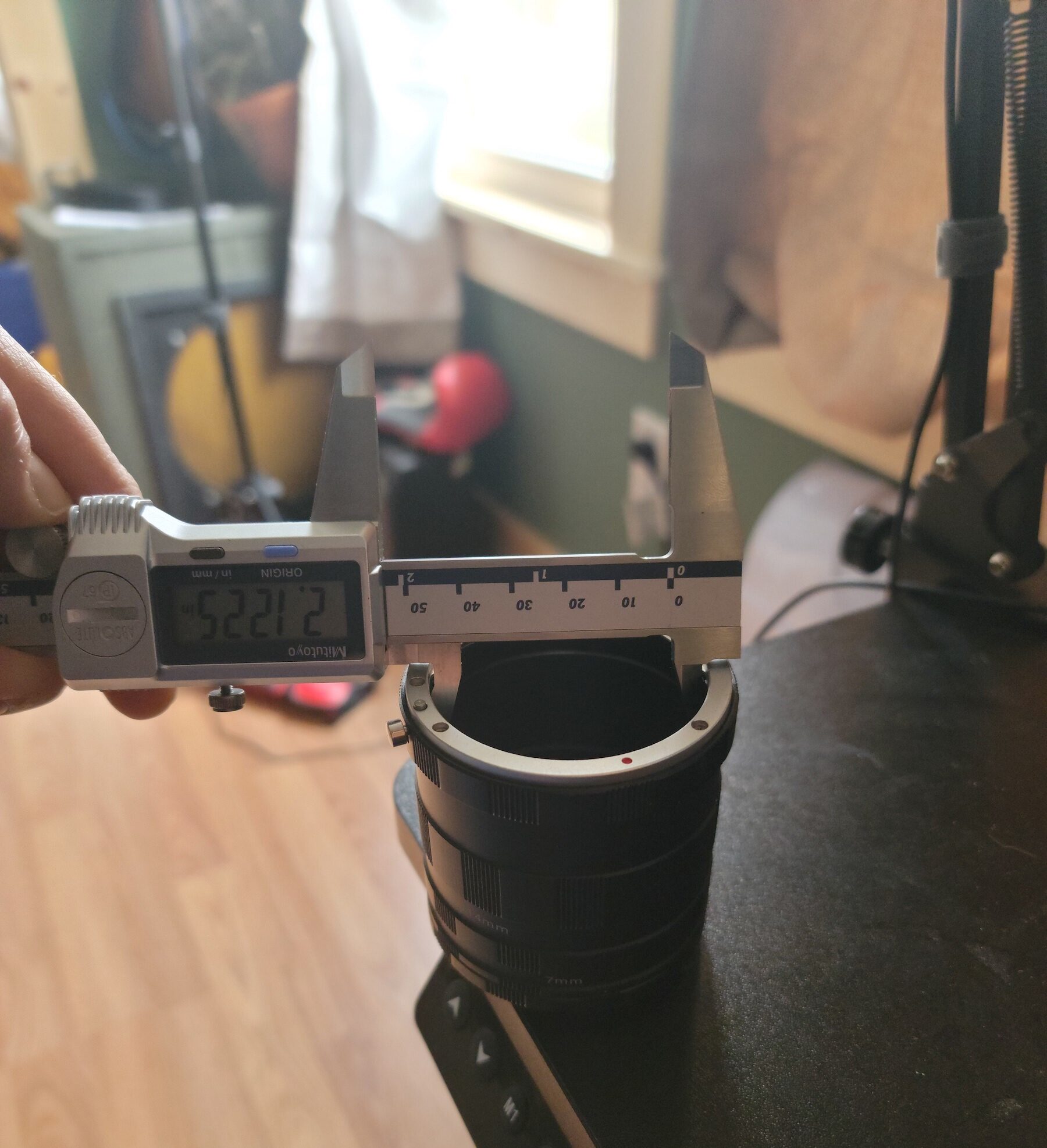
Material
Digital calipers are made of stainless steel, carbon fiber, or plastic; each material has its own pros and cons. Stainless steel is the material most frequently used on higher-end digital calipers. It’s strong and heavy and resists water, dirt, and oil. Stainless steel digital calipers are also usually the most expensive.
Carbon fiber is lightweight with a moderate level of durability. Its tightly woven carbon polymer fibers are as strong as steel with a fraction of the weight. However, carbon fiber isn’t as corrosion-resistant as stainless steel, and it can deteriorate more rapidly if exposed to water, dirt, or UV rays. With a few exceptions, carbon fiber calipers are usually cheaper than stainless steel calipers.
Plastic calipers are often the least expensive and lightest, but the least durable. Professionals or serious DIYers rarely use plastic digital calipers.
Finally, composite calipers are a hybrid combination of standard plastic and carbon fiber, offering a middle ground between plastic and carbon fiber in durability and affordability.
Accuracy
One of the primary benefits of digital calipers is their ability to take highly accurate measurements. A digital caliper can measure in increments as small as 0.01 inches (0.25 mm) or 0.0005 inches (0.0125 mm), depending on the quality of the tool and the operator’s skill level. The electronic components that translate the distance between the inside and outside jaws have the greatest impact on the calipers’ level of accuracy. However, certain hardware components can also play a role.
Digital calipers made of polished stainless steel usually provide smoother movement of the measuring jaws. By providing additional grip for the fingers to slide the jaws up and down, a large, textured driving wheel can also help make more refined adjustments. The overall accuracy of a pair of digital calipers depends on a combination of the user’s skill and the unit’s individual features.
Depth Gauge
When thinking of calipers, two sets of measuring jaws that open and close on the top portion of the scale come to mind. The depth gauge, the third tool, is a small rod extending and retracting from the caliper bar’s end. Use it to measure the depths of holes, cavities, and other recessions.
As useful as they are, the depth gauge can be incredibly fragile in a low-quality pair of calipers. If the depth gauge is important for a specific need, ensure it’s robust enough to withstand regular use. Stainless steel and carbon fiber usually fit the bill, whereas plastic or composite materials aren’t recommended.
Inside/Outside Jaws
The most frequently used parts of a set of digital calipers, the inside and outside jaws, measure an object’s inside and outside dimensions. They’re on opposing sides of the calipers’ main scale, and the outside jaws are larger than the inside jaws. Use the outside jaws to measure the outside diameter of an object and the inside jaws to measure the inside diameter of an object. Like the depth gauge, the inside and outside jaws move as the thumbwheels turn until the jaws come into contact with the object.
The digital calipers should have strong, sturdy inside and outside jaws to ensure consistently accurate measurements. Pay special attention to the construction quality of the inside jaws.
Metric Systems
Some users need the measurement to use the Imperial system (inches and feet), while others require the metric system (millimeters and centimeters). One type of measuring system is more common in different parts of the world, but DIYers may encounter both types. For instance, various automakers use parts based on different measurement systems.
Fortunately, almost all digital calipers display measurements in both inches and millimeters. A button on the LCD display typically appears to switch between the two measuring systems. Both systems are often printed on the main scale.
Additional Features
Along with the essentials discussed above, look for several additional features on a pair of digital calipers, including:
- Large LCD display screen
- Reset button, also called the “zero button,” allows the user to reset the display measurement to zero
- Locking screw locks the inside and outside jaws in place
- Automatic LCD display shutoff to preserve battery life
- Data transfer port to upload measurements to specialized software
IP54 Protection Certificate
Some digital calipers are designed for use in environments unfavorable to electronics, such as machine shops or outdoors. If this is a priority, ensure the digital calipers chosen can withstand these harsh conditions, where an IP (or ingress protection) rating comes in. IP testing is a third-party certification process that verifies the environmental resilience of electronic components.
The first number after “IP” represents the item’s level of protection against solids, and the second number represents the tool’s level of moisture resistance. For a digital caliper, the industry standard is IP54. The “5” means it can resist dust, while the “4” can resist water splashes from all directions. If a pair of digital calipers will experience harsh conditions, especially in outdoor environments, look for an IP54 protection certificate.
Ease of Use
Taking detailed measurements can be tedious enough, so most users look for calipers that are easy to use. Fortunately, most of the features that contribute to the accuracy level of a pair of digital calipers also make them easier to use, such as polished stainless steel parts and a large, textured thumbwheel. Many additional features also help make the calipers easier to use, such as a large LCD display and locking screw.
Tips for Using Digital Calipers
Even with the best digital calipers money can buy, DIYers must know how to properly use the tool. Here are some basic tips from our writers and our expert, John Mazzuca, a home builder and the owner of Gambrick in Point Pleasant, New Jersey. Firstly, Mazzuca states that “knowing how to zero the device before taking a measurement is probably the most important skill to master because it helps prevent an inaccurate measurement.” Once the display reads “0,” begin turning the thumbwheel until the inside or outside jaws make firm contact with the object. Use the outside (lower) jaws to read the outside diameter of an object, and use the inside (upper) jaws for measuring the inside diameter.
Use the depth gauge to measure the depth of an object, groove, or recession. Make sure the bottom of the caliper is perpendicular to the measured object, and slide the thumbwheel until the tip of the depth gauge bottoms out in the object. Marzzuco also made a point to tell users that they “should also be aware of how important cleaning the caliper’s jaws after each use is to prevent debris from affecting the reading.”
Here are a few more tips:
- Tighten the locking screw after measuring to save or transfer it.
- Regularly check for signs of wear and tear, such as scratches or burrs, on the jaws and scale that could affect the accuracy of a caliper’s measurements.
- Calibrate calipers once a year, either professionally or with a calibration gauge, to ensure accurate measurements. If the calipers didn’t come with a calibration certificate, calibrate them after the initial purchase.
FAQs
If some questions that weren’t addressed in this guide still linger, consider the following answers to the most frequently asked questions.
Q. How do digital calipers work?
Digital calipers use a digital encoder that displays measurements on a digital interface instead of the rack-and-pinion system analog calipers display on a round dial.
Q. What are the advantages of digital calipers?
Digital calipers can take highly accurate measurements (to 0.0005 inch) of an object’s inside diameter, outside diameter, and depth. Digital calipers can automatically convert between standard and metric measurement systems, have an easy-to-read digital display, and offer higher accuracy than analog sets.
Q. How do you use digital calipers?
To measure an object’s outside diameter, place the outside jaws parallel to the object’s sides and turn the thumbwheel until the jaws firmly contact the object. For the inside diameter, place the inside jaws parallel to the object’s sides. Place the base of the caliper perpendicular to the object to measure its depth.
Meet the Tester
Tom Scalisi is a full-time DIY and construction writer for many of the largest websites in the industry, including BobVila.com, This Old House, Family Handyman, and Forbes as well as his own pest control blog.
Additional research provided by James Fitzgerald.
